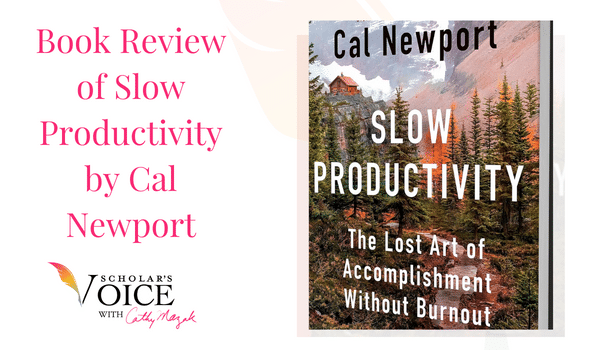Why You Don’t Have to Write Every Day (and What to Do Instead)

This might shock you, but I’m a writing coach that doesn’t believe you should try to write every day. In fact, writing every day could be counterproductive to your writing goals.
MORE DETAILS
Everyone wants to write and publish more. Academia demands it; it’s how we get jobs, keep jobs, and get promoted. More importantly, it’s how we influence our field, get our message out to the world, and spread knowledge that can help change lives. But how do we do it?
Many sources push a system of writing every day, no matter what. In this episode, I’m going to share why trying to write every day can be a bad idea, and what you can do instead.
Writing Every Day isn’t for Everyone
When you research how to be more productive in your writing, you might find answers like: “Do it every day. Don’t miss a day. Hit a word count. Get accountability systems so that you continue to write every day.”
If the “write every day” method appeals to you, then please, do it!
But as an academic mom of three, this has never worked for me. And this method can have negative consequences for your writing.
“It can actually be counterproductive to write daily.”
Why Trying to Write Every Day Could Be Counterproductive
If you are trying to force yourself to write every day, you could be setting yourself up for failure.
Here’s why a goal of writing every day can backfire:
1. You slip and feel guilty. If your goal is to write every day, what happens when you don’t? What happens when your kid gets a fever, your department chair need a fire put out, or you yourself wake up sick? You miss a day, and then you feel guilty.
“Guilt is the biggest obstacle to writing and publishing more.”
Guilt stamps down writing spark and creativity. It pretty much guarantees that you will feel worse when you sit down to try again. You need a system that sets you up for success, so you feel good about sitting down to write, every time.
2. Not All Writing Sessions are Created Equal. Have you ever sat down to write and the words just flowed out of you?
At other times, have you sat down to write just one paragraph and ended up writing five words and deleting three over and over, so that by the end of your session you only had a sentence or two?
That’s because not all writing sessions are created equal.
“You need to be setting yourself up to write during your ‘flow’ times, and to deliberately avoid writing at other times.”
If your writing system is simply to write every day, you might be hitting your flow time and you might not.
When you don’t hit those “flow” times, but sit down and try to bang out a certain number of words anyway, you could be creating a negative feedback loop between you and your writing. You write, you feel bad, you write, you feel bad. Then you might stop. Or you might end up dreading to write. That’s not what we want!
So what is a system that takes advantage of times you are in flow, and cuts out the guilt? I call it Tiger Time, a name I borrowed from entrepreneur Amy Porterfield.
Tiger Time: What Is It and How Can It Help You?
Using tiger time creates positive feedback loops around your writing. The tiger time system works well for those who struggle with guilt, because it gives you permission to not be writing all the time. It breaks writing up into smaller time slots and makes it a regular habit. And it can help you find your writing “spark” because you are writing during your most naturally energized and productive times.
“Write during your best, most focused, most high energy times, and do not write at other times.”
So how do you implement the tiger time system?
1. Identify your “tiger time”. To find your tiger time, keep a journal for 5 days. About every hour, pull out your journal and reflect on how you’re feeling, then mark that hour with a color based on this key:
- Green: the most energy, inspiration, and drive
- Blue: still energized but need to take more breaks to sustain momentum
- Orange: distracted, bored, tired, procrastinating
- Red: complete exhaustion, there’s no way you’re getting anything done
After the 5 days, look back over your color-coded journal. Blue times are your tiger times, and green times are your second best choice.
2. Block off 1-2 hour chunks of tiger time on your calendar. Don’t try to block off more than 1-2 hours at a time. If you can’t do 1-2 hours in a row, that’s fine. Try to do one hour during your tiger time and another hour during your second best time. If you can only do one hour, or 30 minutes, that’s fine too. The important thing is being realistic and consistent.
3. Align your writing blocks with your real life. Do you have obligations during those times? Do your best to reschedule. Maybe you teach during that time this semester, but you can change your schedule for next semester.
Of course, there are things we can’t change, like having to drop our kids at school at a certain time. But I encourage you to be creative. Is there a parent who you could partner with to alternate school pick up and drop off?
Be diligent, and guard this time. Your tiger time is precious, so don’t let requests from other people or other aspects of your job crowd it out.
If you can write every day and feel happy about it, then fantastic. But if trying to write every day doesn’t work for you, I encourage you to find your tiger time (scholarsvoice.org/tigertime for the free journal) and give my system a try.
“Done is better than perfect, and consistent is better than perfect.”
Connect with me:
RELATED PODCASTS
Stay current in Academic Publishing
Subscribe to our newsletter:
In the Pipeline
writing tips, publishing trends, reading recomendations, free workshops





